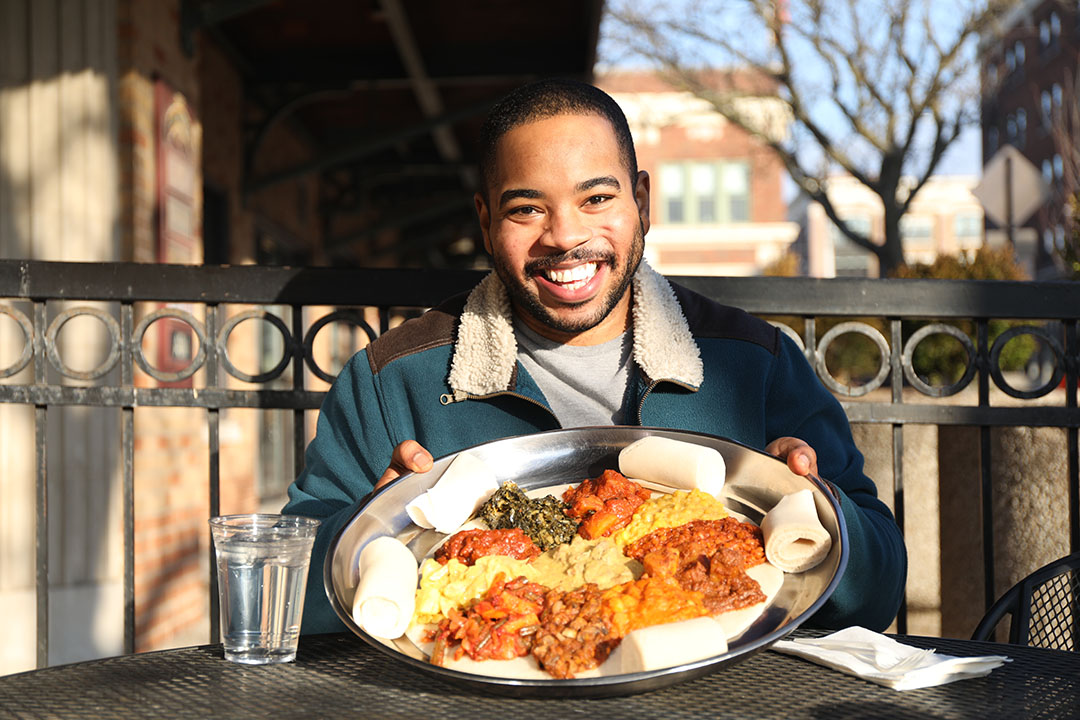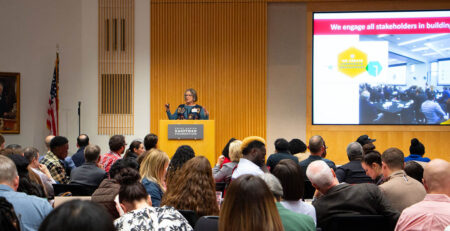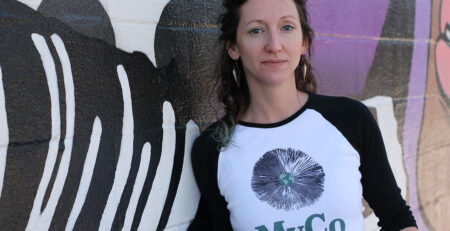How to Be an Influencer and Content Creator, According to 6 Pros Who Made It Their Career
If you’re wondering about how to be an influencer or content creator, we built this blog to show you how to successfully pursue this form of entrepreneurship. With time, effort and the right strategies, you can build a successful business around writing blogs and newsletters, producing videos, hosting podcasts, live streaming and developing creative content for ads and brand partnerships. With the creator economy projected to hit $480 billion by 2027, up from $250 billion today, it’s clear these modern business ventures have the potential to replace or supplement more traditional paths.
Need help with launching your business? KCSourceLink’s Network Navigators are here to help. Just answer a few questions, and they’ll create your free Personal Action Plan. It’s an individualized checklist of what to do and who to meet to start making your business goals a reality.
Read on to learn how six Kansas City creators and influencers, across some of the most popular content niches, built their brands and grew their enterprises. They share how they make money, the challenges they face and useful advice for those who want to follow in their digital footsteps.
Q: How do you make money as a content creator/influencer and how long does it take to become profitable?
Kasim Hardaway, culinary artist, videographer and content creator: It took me about three-and-a-half to four years to make a full-time living as a content creator. I could have gotten there quicker, but I was very cautious and continued to work another job while doing my digital influencer brand work on the side.
Today, my biggest income stream is sponsored partnerships with brands in the grocery and consumer packaged good spaces. This includes creating content that could be used for social media, paid ads or email marketing and/or serving as a brand ambassador and spokesperson. Outside of that, I also sell recipes. Another way for a content creator or influencer to make money is to set up a website with advertising.
Jaron Myers, comedian and content creator: It took me about five years to make a living off of this. My income is mostly from live comedy shows, and I use the content I create on social media as the top of my marketing funnel for my shows. I also use social media to promote my podcast which generates revenue from Patreon (a monetization platform that provides business tools for content creators to run a subscription service and sell digital products), ads and merchandise.
Another revenue stream for me is creating sponsored content. For example, I’ve made videos for brands like Pringles and Eggo. I’ve gotten most of my brand deals through influencer websites that act as agents, such as Aspire. If a brand is looking for creatives, they can find you through those websites. Sometimes brands direct message me, or my assistant will reach out to brands that I already use and ask if they’re looking for social media creatives for brand sponsorships. If you reach out to 90 or 100 people, you might get seven yeses, and that’s how you start making money.
I only pursue things that pay, rather than getting free products, because you could sink so much time into doing all these free things, and all you end up with is stuff that you don’t need or want. So even if you’re just starting out, there are opportunities for you to at least make $75 and grow from there.
I also generate a small portion of my income from ads on YouTube and Facebook.
Corissa Enneking, content creator, influencer and founder, Fat Girl Flow: Most of my money is made from Fatgirlflow.com and not directly from social media. I have always had a website and never relied on social media for income, and that has made doing this full time far less stressful. My blog generates income passively through affiliate links and ad placements. Less than 10% of my income is from social media.
Jasmine Green, lifestyle content creator and strategist, Jasmine Diane: I generate income from my events, products and services. For example, I’ve written some e-books on how to market events and how to use LinkedIn for personal branding. I host a networking brunch as well as branding workshops throughout the year. I also have sponsored posts where I highlight specific products on Instagram and on my blog.
Right now, content creation is my side passion. I work on it nights, weekends and early mornings. I desire in the next five years for my husband, who is an amazing photographer, and I to be full-time creators or have our own agency.
Yesica Orozco, content creator: The way I make money on social media is through sponsored posts on Tiktok and Instagram. I also get paid for creating UGC content for brands to post on their social media. Social media is 50% of my income and the other 50% is from my full-time job.
Riley Brain, owner of Wandering Bud, content creator: The vast majority of my income is from my handmade ceramic smokeware business. I spend about 20 hours a week creating video content for social media as the main marketing tool for the company. We are part of TikTok’s monetization program. We’ve gone viral a couple of times, and one of my videos got around 4 million views which is equivalent to $3,500. It’s definitely a small portion of the money we bring into the business, but it’s really helpful. It kind of pays for my efforts in making all these videos.
Q: What are your tips for getting started and growing as a content creator and influencer?
Jasmine: You have to jump and start the journey. It’s really about getting out of your own head. So many people don’t start because they’re afraid. But, if you had started six years ago, who knows where you could be now? Write out what you want to do, who you want to impact and how you plan to do it. I would also tell people to be authentic and tell their true story. That’s how you build real connections with people and maintain a following. Lastly, be nimble in your approach to learning and acquiring new skills.
Jaron: The only way to start is to just start. Also, you need to be patient. There are some people who think out the gate in the first month they’re going to make money and reach all their goals. When that doesn’t happen right away, they’re ready to give up.
Another tip is to focus on creating content that you actually like, not just what’s popular or trending. Lastly, I’d recommend reading “The Creative Curve” by Allen Gannett, “How to Grow Your Small Business” by Donald Miller, “Atomic Habits” by James Clear and “Your Best Year Ever” by Michael Hyatt.
Corissa: Just get started. The growth part is fun for audiences to participate in. Don’t get hung up on perfectly executing everything, just show up and see what happens. Also, have a plan for how you’ll earn money. Don’t just hope money will come.
Yesica: My biggest advice is to post everything you create and be consistent. Even when it feels like your videos and photos are not performing as well as you’d like, always keep posting.
I post at least once a day, and sometimes if I have extra content or something trendy comes up, I will post twice a day. I always try to stay on schedule because I’ve seen that if I stop posting for even three or four days, my views and engagement are affected. To make sure I have enough content ready to post, I take about six hours on Saturday morning to record videos for the full week. Then I take another one to two hours to edit everything.
Riley: I hear from a lot of fellow small business owners that they are afraid to start. They’re embarrassed about the way they’re going to look, or they’re embarrassed about the way their voice is going to sound or whatever it is. So my advice is really just to start. Nobody’s judging you, and if they are, block them because they’re not worth the time.
I’d also recommend the book “Mindset” by Carol Dweck for all entrepreneurs. It’s about the difference between a growth mindset and a fixed mindset. If you have a growth mindset, you believe you can learn to do anything with time, guidance and practice. If you have a fixed mindset, you believe you’re born with all your skills and abilities and you can’t really learn to be good at things. You have to believe you can learn to do anything the business requires of you. That’s really how I’ve learned social media. I also follow a lot of creators, both on Instagram and on TikTok, who give advice to other creators. I’ll see what they have to say and try it in my own videos if it’s something I think will work for our audience.
Q: What’s the biggest challenge of being a content entrepreneur?
Jasmine: One of the biggest challenges is finding time to do everything. I have to make sure I’m staying organized and allotting enough time for the different areas of my business, like brainstorming, planning, creating, writing and editing.
Kasim: One of the most difficult things about being a content creator is that you are forever creating content. The social media algorithm rewards consistency, so you have to stay on top of your posting schedule. I really love doing it, but it can be challenging to step up to the plate every time and remain creative, even when you have an artistic block.
Riley: With the ever-changing algorithms, strategies that have been tried and true and have worked for weeks or for months will all of a sudden one day just stop working. When your business is highly reliant on reaching people through social media, that can be really frustrating. So, we’ve started building up our email list because that is a communication channel we can control.
Another thing that’s tough is the change in the culture and comment sections on social media. It used to be every single comment we got was really supportive and kind, recognizing the fact that we’re humans and artists who are just doing our best. If people had questions, they asked them respectfully because they were curious. Now, more often, some people are mean, ruthless and disrespectful. This mostly happens when a video goes viral and reaches millions of people who are outside of our normal audience. I’ve learned to conserve my energy and just block people who are like that because it can get exhausting to deal with.
Corissa: It’s a lot of responsibility to work for yourself and not have a salary. Learning how to do your own taxes and manage a business income is no joke. But it’s worth it! I think a lot of people assume you just turn your camera on and go, but there’s a lot more to managing content creation than that. I have built a business model that is sustainable and will hopefully produce income for many years.
Yesica: The biggest thing I’ve struggled with as a creator is hate from people on social media. Unfortunately, that’s always something that will be part of it. Another challenging thing is being rejected when you apply to campaigns. That’s always a bummer.
Jaron: The most challenging part is the internet is full of people who have an opinion on everything, good or bad. As a stand up comic, people don’t heckle me all that much in person, but on the internet, people are bold. It took me a while to figure out how to create healthy boundaries with how I use social media because I want people to see me authentically online. But I also don’t want them to feel like they have permission to say insane things to me in my DMs. You’ve got to have tough skin and let that stuff roll off.
What Kansas City resources have helped you on your journey of becoming a content entrepreneur?
Jasmine: My husband and I both did the SCORE Kansas City program for a year. We had an amazing business coach who taught us about business principles, how to identify our product and how to make money from it. Global Entrepreneurship Week – Kansas City was also super helpful for learning about brand building and for networking with other entrepreneurs. I also did Entrepreneurship Business Basics and that was a really great foundation as well and helped us put together our business and marketing plans.
Kasim: KCSourceLink was integral. When I was first starting out, I would go to GEWKC to attend a few different classes. Then, one year, I also taught a course on influencer marketing, and I met a couple of people who were instrumental in my career as an entrepreneur. Visit KC was really integral as well. During my time as a student at the University of Missouri – Kansas City, I was in Enactus, a business organization that taught me a lot about entrepreneurship.




